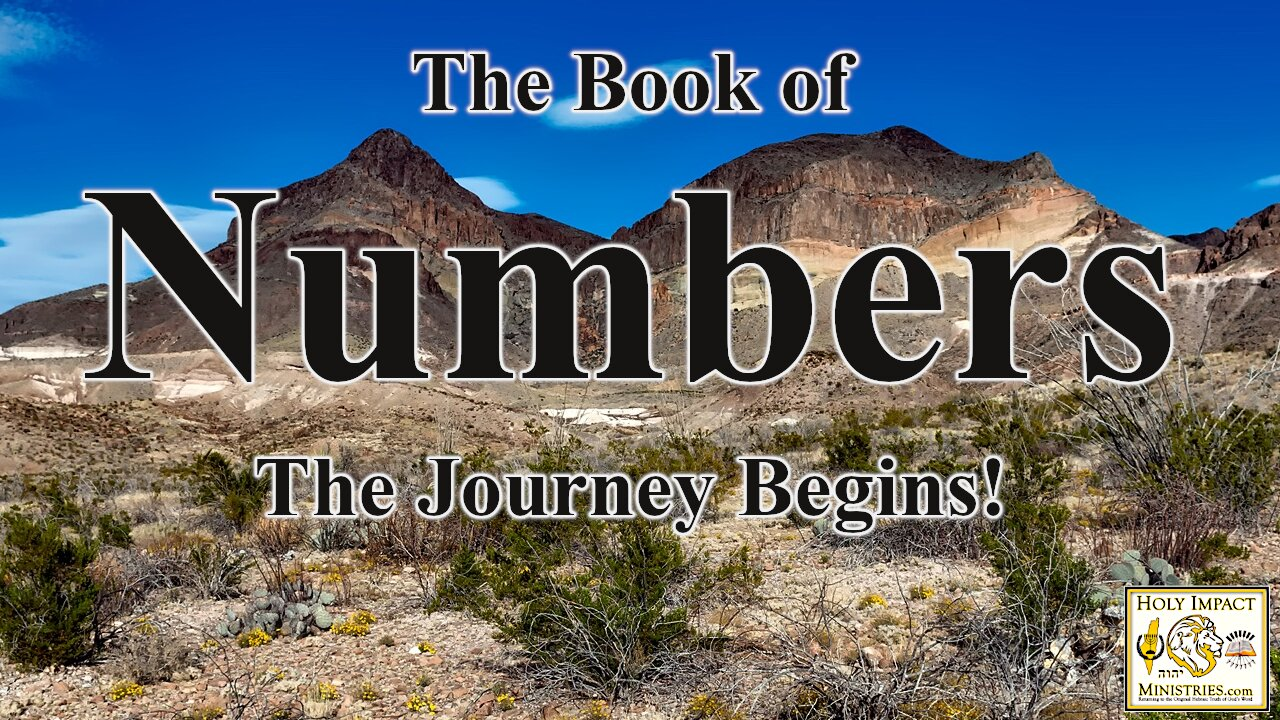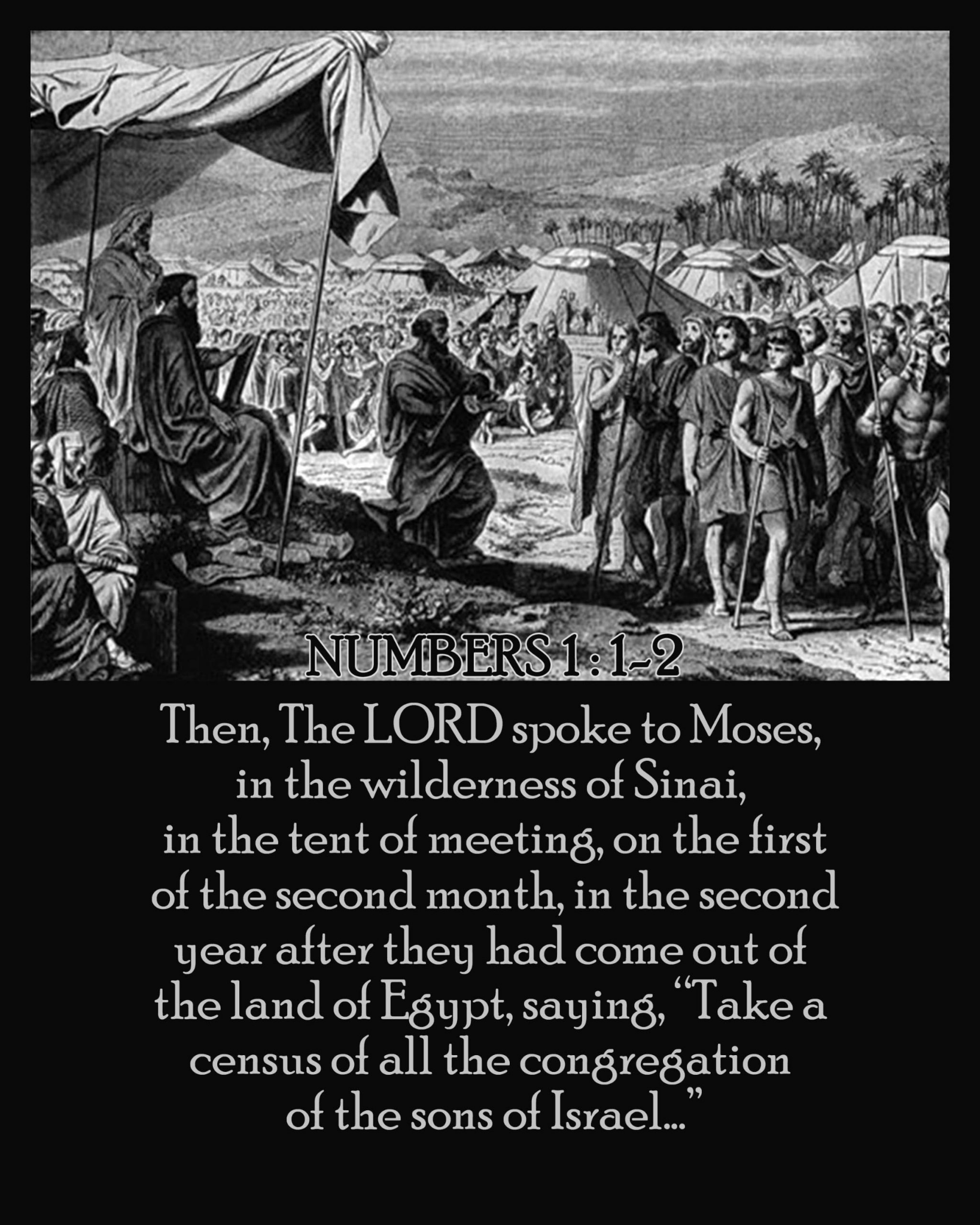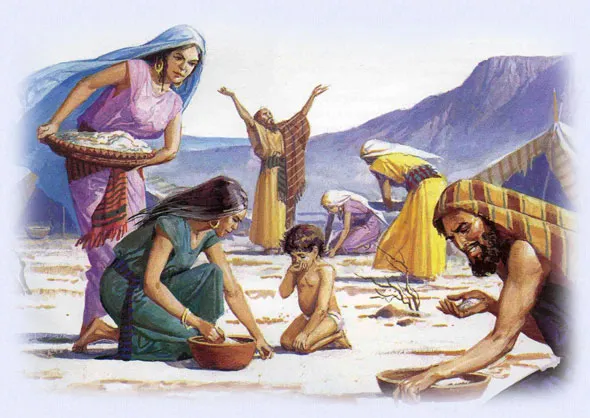Numbers 1:1-4: Lessons Regarding Why God Sometimes Sends His People into the Wilderness

Image credit1
1. The Two Themes of Numbers. Nu. 1:1; 1 Cor. 10:1-6.
The timing of the departure. God ordered that the people be assembled for battle to conquer the Promised Land in the second month of the second year after leaving Egypt “Now the Lord spoke to Moses in the wilderness of Sinai, in the tent of meeting, on the first day of the second month, in the second year after they had come out of the land of Egypt, saying,” (Nu. 1:1). This was one month after God told the Jews to build the Tabernacle for Him to dwell with them (Ex. 40:17). Everything in the Bible has a meaning. Thus, we must ask what symbolic meaning there is to the number two and how it applies here. Generally, the number two symbolizes confirmation. By two or more witnesses, a matter is confirmed (Dt. 19:15; Matt. 18:11; 2 Cr. 13:1). Jesus wrote the Ten Commandments on two tables. And there are two testaments. This book is about two people, each serving as a witness to us.
The promise to a people of faith. God told Moses to assemble an army because He desired to fulfill His promise to His people to bring them to the Promised Land. He wanted them to be brave and march straight from Mount Horeb and then conquer the Promised Land. But they failed to live up to their calling. The next generation was then called upon to fulfill God’s promises. We also live in a hostile wilderness. God does not want us to fear any person or enemy (Rom. 8:15). Like the Jews, you are also commanded to “fight the good fight of faith . . . ” (1 Tim. 6:12). You are called to fight in His army (2 Tim. 2:3). Are you responding to the call to serve?
The consequences of a life without faith. Sadly, the Jews’ journey to the Promised Land suffered a major detour. Their journey from Mount Horeb should have lasted only 11 days (Dt. 1:2). Yet, they failed to believe God’s promises and rebelled against His command to enter the Promised Land. They then spent an additional 38 years wandering in the wilderness. A life without faith cannot please God and will result in a life spent suffering in the wilderness. Have you rebelled against His will? How long will you wander in the wilderness before you return to Him?
2. God’s Three Orders For a Census. Nu. 1:2-4; 26:2; Ex. 30:11-12.
Numbers 1:2-4. “2 Take a census of all the congregation of the sons of Israel, by their families, by their fathers’ households, according to the number of names, every male, head by head 3 from twenty years old and upward, whoever is able to go to war in Israel. You and Aaron shall count them by their armies. 4 With you, moreover, there shall be a man of each tribe, each one head of his father’s household.” (Nu. 1:2-4).
The first census – God cares about all His people. God knows every hair on your head (Matt. 10:29; Lk. 12:17). He not only knows about you. He cares about you as well. He had the priests perform the first census count (Ex. 30:11-12). The priests did the general census because they could not be burdened to pray for their people and care for their needs if they did not know who their people were. Today, any believer in Christ is part of God’s holy priesthood (2 Pet. 2:5, 9; Rev. 1:6). Can we really claim that we care about the people who come in and out of our lives or churches if we don’t know their names and their problems?
Image credit2
The second census – God wants to find those who will fight for Him. A mixed multitude came out of Egypt (Ex. 12:38; Nu. 11:4). Not everyone could fight, only those males who were 20 years old and who could identify their pedigree or heritage within the 12 tribes. God did not want to include soldiers in His army any who had mixed allegiances. Nor did He want those who were not ready to fight for Him. Today, He is again looking to find those who will be counted as part of His army (2 Tim. 2:3). In His army, the only sword you will be issued is the Word of God (Eph. 6:17; Heb. 4:12). How many verses do you know? Will you be wielding a pocket knife, a foil, a samurai sword, or a two-handed sword?
The third census – God will bless those who follow His will and curse those who don’t. In Numbers 26:2, God ordered a third census. The tribes who rebelled against Him shrank in number. By contrast, the tribes who trusted in Him grew in number. As a nation, the people must follow His Ten Commandment to be blessed and grow in number (Lev. 26:9-10). As the western world turns against God it will also decline in the wilderness.
3. Seven Reasons Why We Wind Up In The Wilderness.
God spoke to Moses in “the wilderness” (Nu. 1:1). The Hebrew title of this book, Bamidbar, translates as “in the wilderness.” The English title “Numbers” comes from the Greek Septuagint. It comes from the census that was taken at the beginning and end of this book. But the title “wilderness” better describes what this book is about. As set forth below, the wilderness can be filled with paradoxes. In some ways, it is a punishment. In other ways, it can serve as a blessing. Here are seven things to consider about the wilderness.
(1) God brings us there when we sin. The wilderness was a place where God sent people to die for their sins (Nu. 14:35). The first generation of Israel murmured against God, and had been taken into the wilderness to die. Salvation does not turn on obedience (Gal. 2:21). Yet, there are still consequences when a nation lives in open rebellion against God’s Law. Just before the journey began, He warned that a person or a nation in open rebellion will go through 12 stages of progress discipline in the wilderness:
(1) fear (Lev. 26:14-16(a));
(2) paranoia of control by one’s enemies (Lev. 26:16(b)-17);
(3) the loss of pride (Lev. 26:18-19);
(4) fruitless labors (Lev. 26:20-22, 16(a));
(5) torment (Lev. 26:23-25; Lk. 16:25);
(6) the loss of satisfaction (Lev. 26:26);
(7) strained family relations (Lev. 26:27-29);
(8) the loss of worldly idols (things you depend upon) (Lev 26:30-31(a));
(9) prayers not being heard or “hindered” (Lev. 26:31(b); 1 Pet. 3:7);
(10) barren lands (Lev. 26:32-35.);
(11) paranoia everywhere (Lev. 26:36-37); and
(12) rotting strength (Lev. 26:38-39). Has sin brought you into the wilderness? How much discipline does God need to apply before you turn back?
(2) God shows us there what is in our hearts. The wilderness includes “snakes and scorpions.” (Dt. 8:15). Snakes and scorpions represent evil spirits (Lk. 10:18-19; Isa. 13:21-22; 34:10-15). Even the Devil tried unsuccessfully to tempt Jesus in the wilderness (Matt. 4:1). God searches our hearts and tests our minds (Jer. 17:10; Ex. 20:20). When we are tested, we frequently find that our hearts are wicked and we are in need of repentance (Jer. 17:9). The last time you found yourself in the wilderness because of your sin, what did you find when God showed you what was in your heart? Did you then repent of that sin?
(3) God provides refuge there. Hagar went into the wilderness to escape Sarah. Moses and the nation of Israel later fled from Pharaoh into the wilderness. While in the wilderness, God protected the Jews both day and night (Ex. 13:21). To escape Saul, David took shelter in the wilderness. Jesus also hid in the wilderness (Jo. 11:54). In the end times, the wilderness will also be a place of refuge from the evil one (Rev. 12:6; see also, Jer. 2:2). Today, Jesus protects us on our journey through the desert from the evil one (Matt. 6:13). Are you calling out to Him for protection if you feel under attack?
(4) God speaks to us there. In Hosea 2:14, God says “Therefore, behold, I will allure her, bring her into the wilderness and speak kindly to her.” Sometimes our life is so busy that we can’t hear God’s voice and direction for us. Sometimes, He must pull us into the wilderness before we will finally listen to Him. If every minute of your day is filled with activity, how much time does He have to speak with you?
(5) God’s will for us is revealed there. Jesus, the great “I AM”, spoke to Moses in the wilderness (Jo. 8:58; Ex. 3:14). He also gave the Ten Commandments and the other laws there. Jesus later preached in the open spaces. The Rabbis believed that God gave the Law in the wilderness because it belonged to everyone. If we need to leave the busy places of our lives and retreat into the wilderness to have Him speak to us, how can we expect to learn His will for us unless we go there?
(6) God forces us to depend upon Him there. Every good and perfect thing in our lives comes from above (Jam. 1:17). In the wilderness, we are forced to face this fact. In a city, this is not always the case. As Moses warned: “you may say in your heart, ‘my power and my strength of my hand made me this wealth.” (Dt. 8:17). When everything you normally depend upon fails you, do you turn to God for help?
(7) God provides for us in the wilderness. God also cares for us in the wilderness (Hos. 13:5). Through Christ, He provided manna and water in the desert (Matt. 4:4; Jo. 6:33-35). He fed Elijah while he was in the wilderness (1 Kgs. 17:2-6). He also provided for Hagar in the wilderness (Gen. 21:19). At the time of the festival on Sukkot, the Jews build small booths to live in for a week. They celebrated His provision during their time in the wilderness (Ex. 25:8; 29:44-45; Dt. 16:13-15). How often do you give thanks for His provision?
Image credit3

